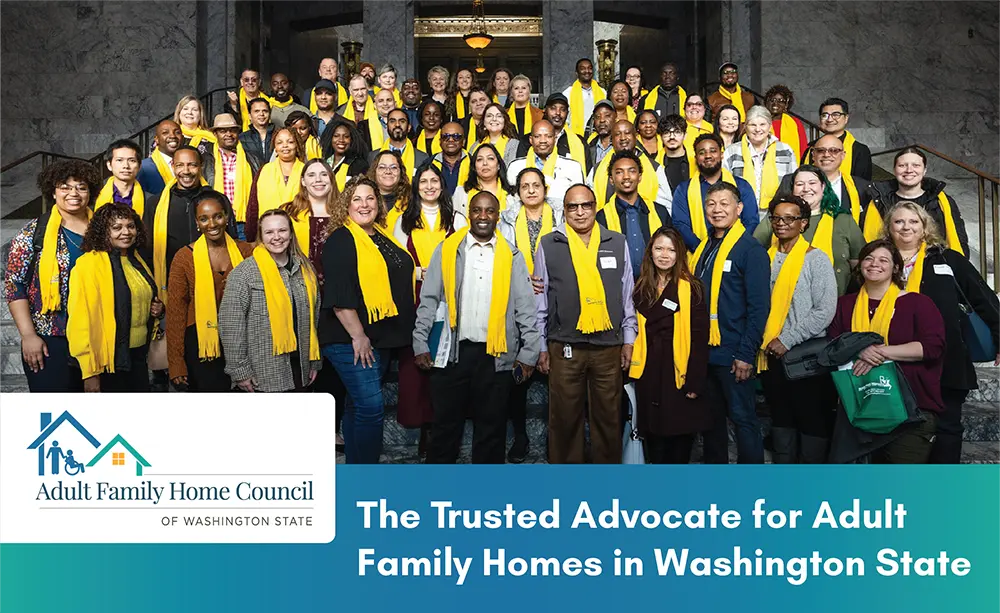
There's a WAC for That!
Ensuring Compliance with Transfer and Discharge Regulations
A recent article in The Columbian, titled “Vulnerable people quietly kicked out of Clark County’s adult family homes and assisted living facilities,” has raised concerns about the perception of inappropriate discharges from our settings. While the article acknowledges there is no measure of this alleged activity, it is crucial that we address these concerns to maintain the trust of potential residents and their families.
Adhering to WAC Regulations
As providers, it is our responsibility to ensure that all transfers and discharges comply with the Washington Administrative Code (WAC) 388-76-10615. According to these regulations, a resident can only be transferred or discharged if:
- The transfer or discharge is necessary for the resident’s welfare and their needs cannot be met in the home.
- The safety or health of individuals in the home is or would be endangered.
- The resident has failed to make the required payment for their stay.
- The home ceases to operate
Before proceeding with a transfer or discharge, we must first attempt to avoid it through reasonable accommodations, unless agreed to by the resident.
Using the DSHS Form
It is essential to use the Department of Social and Health Services (DSHS) form for any transfer or discharge. This form ensures that all necessary information is documented and communicated clearly to the resident and their family. DSHS form 15-458 Adult Family Home Notice of Transfer or Discharge.
Engaging RCS Behavioral Health Support Services
For residents with behavioral health challenges, we encourage you to engage the Residential Care Services (RCS) Behavioral Health Support Team. This team offers resident-specific consultations and group training for staff, helping to navigate and address behavioral issues before they escalate.
You can make a referral or ask a question by emailing RCSBHST@dshs.wa.gov.
More information about the BHST is available at our website and in our brochure.
For training referrals or questions please email ALTSABHSTTraining@dshs.wa.gov
Exploring Reasonable Accommodations
We must explore every avenue for reasonable accommodations to support our residents. Reasonable accommodations can include changes to policies, practices, or services that allow residents to continue living in their homes comfortably and safely.
Conclusion
It is critical that we uphold the rights of the residents in our care and ensure that all actions taken are in compliance with the law. By following WAC regulations, using the appropriate DSHS forms, engaging RCS Behavioral Health Support Services, and exploring reasonable accommodations, we can address the concerns raised and continue to provide high-quality care to our residents.
Thank you for your dedication and commitment to maintaining the highest standards of care.
Transfer and Discharge WACs
WAC 388-76-10615
Resident rights—Transfer and discharge.
(1) The adult family home must allow each resident to stay in the home and not transfer or discharge the resident unless:
(a) The transfer or discharge is necessary for the resident’s welfare and the resident’s needs cannot be met in the home;
(b) The safety or health of individuals in the home is or would otherwise be endangered;
(c) The resident has failed to make the required payment for their stay; or
(d) The home ceases to operate.
(2) Before a home transfers or discharges a resident, the home must first attempt through reasonable accommodations to avoid the transfer or discharge, unless agreed to by the resident.
(3) The home must give residents enough preparation and orientation to ensure a safe and orderly transfer or discharge from the home.
(4) If the home discharges a resident in violation of this section or WAC 388-76-10616, the home must readmit the resident to the home as soon as a gender-appropriate bed becomes available.
WAC 388-76-10616
Resident rights—Transfer and discharge notice.
(1) Before a home transfers or discharges a resident, the home must give the resident and the resident’s representative a written thirty day notification informing them of the transfer or discharge. The home must also make a reasonable effort to notify, if known, any interested family member. The written notification must be in a language and manner the resident understands and include the following:
(a) The reason for transfer or discharge;
(b) The effective date of transfer or discharge;
(c) The location where the resident is transferred or discharged if known at the time of the thirty-day discharge notice;
(d) The name, address, and telephone number of the state long-term care ombuds;
(e) For residents with developmental disabilities, the mailing address and telephone number of the agency responsible for the protection and advocacy of individuals with a developmental disability; and
(f) For residents with mental illness, the mailing address and telephone number of the agency responsible for the protection and advocacy of individuals with mental illness.
(2) The home may make the notice as soon as practicable before transfer or discharge when:
(a) The safety and health of the individuals in the home would be endangered;
(b) An immediate transfer or discharge is required by the resident’s urgent medical needs; or
(c) The resident has been absent from the home for thirty or more days.
(3) A copy of the written notification must be in the resident’s records.
Not a Member Yet?
Membership fees enable the Council to cover legal expenses and fund staff to advocate with the state and regulatory agencies. The participation of every adult family home is vital to ensuring fair regulations and rates that accurately reflect the costs of caring for our vulnerable adults. Consider becoming a member of the Council to help us continue improving conditions for all adult family homes in Washington State.

